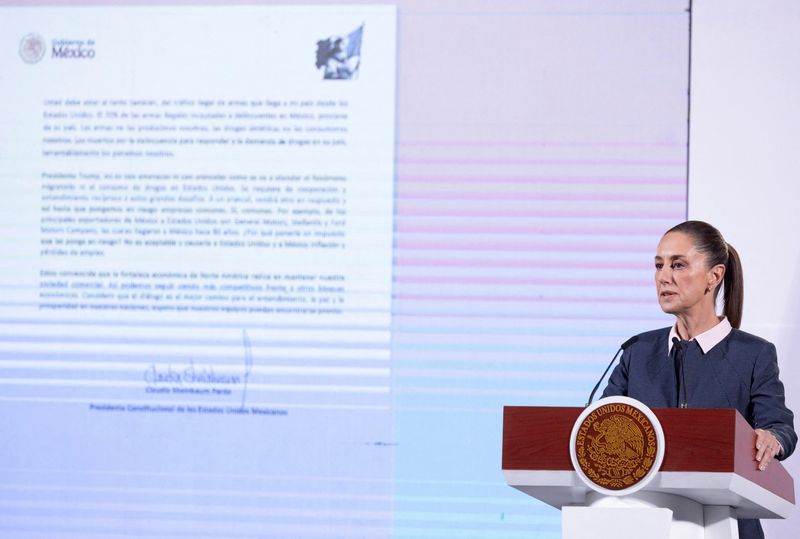By Sarah Morland and Ana Isabel Martinez
MEXICO CITY (Reuters) -Mexico's President Claudia Sheinbaum said on Thursday she and U.S. President-elect Donald Trump had agreed to maintain a good relationship in a friendly phone call that appeared to ease tensions between the top trading partners amid tariff threats.
Sheinbaum struck a more conciliatory tone a day after saying Mexico would retaliate if Trump carries out his pledge to impose a 25% tariff on Mexican and Canadian imports.
"It was a good conversation and we are going to keep having conversations," Sheinbaum told a morning press conference, in which she said the two had not directly discussed tariffs but talked about the reasons Trump gave for potentially implementing them - illegal migration and fentanyl trafficking.
"It was a very friendly conversation," Sheinbaum added. "We agreed there would be a good relationship."
The Mexican peso strengthened close to 1% early on Thursday, after weakening in recent days.
Trump's proposed tariffs would appear to contravene the U.S.-Mexico-Canada free-trade pact, which Trump signed during his first term and is up for review in 2026.
Following Wednesday's call, Trump said on social-media platform Truth Social that Sheinbaum had "agreed to stop migration through Mexico, and into the United States, effectively closing our Southern Border."
Sheinbaum appeared to refute this on X, saying they had discussed Mexico's strategies to curtail migration into the U.S. but Mexico's policy was "not to close borders, but to build bridges between governments and their peoples."
Addressing the apparent discrepancy, Sheinbaum told reporters it came down to different communication styles.
"I can assure you we would never close the Mexico-U.S. border."
Mexico has in recent months increased enforcement significantly, helping keep down numbers of migrants arriving at the U.S. border.
Sheinbaum said Mexican authorities were attending to a caravan near Pijijiapan in southern Chiapas state, which immigration authorities estimate at some 800 people. "This caravan is not going to reach the north," she said.
Some analysts have said they believe the tariffs proposal - which they expect would push up U.S. consumer prices - is a negotiation tactic ahead of the USMCA review.
Mexico accounted for 15.9% of U.S. trade in the first nine months of this year, followed by Canada at 14.4% and China at 10.8%. Trump also suggested 25% tariffs on Canada and "an additional 10% tariff, above any additional tariffs" on China.
While Canadian Prime Minister Justin Trudeau has called for unity and work on the trade relationship, some Canadian officials reacted strongly to Trump's proposal.
"To compare us to Mexico is the most insulting thing I've ever heard from our friends and closest allies," Ontario Premier Doug Ford (NYSE:F) told media this week. "It's like a family member stabbed you right in the heart."

Mexican leaders have called for greater regional cooperation, dialogue and integration.
Earlier on Thursday, Mexican Economy Minister Marcelo Ebrard told reporters he did not believe it was likely the U.S. would impose the proposed tariffs as it would be costly on both sides of the border.